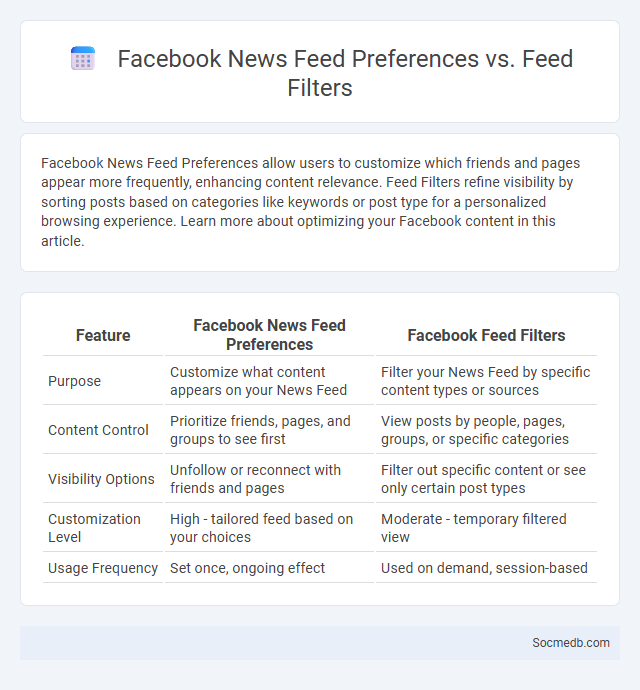
Photo illustration: Facebook News Feed Preferences vs Feed Filters
Facebook News Feed Preferences allow users to customize which friends and pages appear more frequently, enhancing content relevance. Feed Filters refine visibility by sorting posts based on categories like keywords or post type for a personalized browsing experience. Learn more about optimizing your Facebook content in this article.
Table of Comparison
| Feature | Facebook News Feed Preferences | Facebook Feed Filters |
|---|---|---|
| Purpose | Customize what content appears on your News Feed | Filter your News Feed by specific content types or sources |
| Content Control | Prioritize friends, pages, and groups to see first | View posts by people, pages, groups, or specific categories |
| Visibility Options | Unfollow or reconnect with friends and pages | Filter out specific content or see only certain post types |
| Customization Level | High - tailored feed based on your choices | Moderate - temporary filtered view |
| Usage Frequency | Set once, ongoing effect | Used on demand, session-based |
Understanding Facebook News Feed Preferences
Facebook News Feed preferences allow users to customize the content they see by prioritizing posts from friends, pages, and groups they engage with most frequently. Algorithms analyze user interactions, such as likes, comments, and shares, to tailor the feed for personalized relevance and higher engagement. Adjusting these settings directly impacts the visibility of updates, ensuring a more curated and meaningful social media experience.
What Are Facebook Feed Filters?
Facebook feed filters are algorithms designed to curate and personalize the content displayed on Your news feed based on Your interactions, interests, and preferences. These filters prioritize posts, ads, and updates from friends, pages, and groups that are most relevant to You, enhancing engagement and user experience. Understanding how these filters work can help You control and optimize the content You see on Facebook.
News Feed Preferences: Key Features
News Feed Preferences allow users to customize the content they see on platforms like Facebook by prioritizing specific friends, pages, or groups, ensuring a tailored and relevant experience. Features include the ability to unfollow or reconnect with accounts, manage snooze settings for temporary content silencing, and prioritize posts to appear at the top of the news feed. These settings enhance user control over algorithmic content delivery, boosting engagement and satisfaction by aligning the news feed with individual interests.
Feed Filters vs News Feed Preferences: Core Differences
Feed filters control the type of content users see by sorting posts based on relevance, interests, or interactions, optimizing personalized experiences on platforms like Facebook and Instagram. News Feed Preferences allow users to directly customize their timeline by choosing which friends, pages, or groups to prioritize or unfollow, giving manual control over visible updates. The core difference lies in feed filters using algorithmic curation for dynamic content delivery, while News Feed Preferences enable user-driven customization for tailored social media engagement.
Customizing Your Facebook News Experience
Customizing your Facebook news experience allows you to prioritize content that matters most to you by adjusting your news feed preferences and following specific pages or friends. Using features like "See First," unfollowing, or snoozing ensures your feed highlights relevant updates while minimizing distractions. These personalized settings enhance engagement and make your social media experience more meaningful.
Steps to Access News Feed Preferences
Access News Feed Preferences by opening the social media app, tapping the menu icon, and selecting "Settings & Privacy." Navigate to "News Feed Preferences" where you can prioritize who to see first, unfollow people to hide their posts, and reconnect with previously unfollowed accounts. Adjusting these settings optimizes your feed to display relevant, personalized content based on your interests and interactions.
How to Use Feed Filters Effectively
To use feed filters effectively on social media, customize settings to prioritize content from preferred sources, such as influencers, friends, or specific interest groups. Utilize keyword and hashtag filters to eliminate irrelevant posts and streamline your feed for enhanced engagement. Regularly update these filters based on changing preferences and trending topics to maintain a relevant and focused social media experience.
Comparing News Feed Preferences and Feed Filters
Social media users exhibit diverse news feed preferences, with algorithmic feeds prioritizing personalized content based on engagement metrics, while chronological feeds present updates in real-time order. Feed filters, such as topic-based or source-specific filters, enhance user control by allowing customization beyond algorithmic curation, supporting targeted content consumption. Studies reveal that users favor personalized algorithms for discoverability, yet maintain a critical need for transparency and filter options to mitigate echo chamber effects.
Maximizing Your Facebook Content Control
Maximizing your Facebook content control involves strategically managing privacy settings, customizing audience restrictions, and utilizing Facebook's content management tools to ensure your posts reach the desired demographic. Employing features like post scheduling, content insights, and page moderation empowers users and businesses to optimize engagement and maintain brand consistency. Regularly updating permissions and reviewing shared content helps safeguard personal and professional digital presence while enhancing targeted visibility.
Future Trends in Facebook Feed Personalization
Future trends in Facebook feed personalization revolve around advanced AI algorithms that analyze user behavior and preferences to deliver hyper-relevant content. Machine learning models leverage real-time data to dynamically adjust the feed, prioritizing posts, ads, and videos tailored to individual engagement patterns. Privacy-focused enhancements ensure personalized experiences while complying with evolving data protection regulations like GDPR and CCPA.
 socmedb.com
socmedb.com